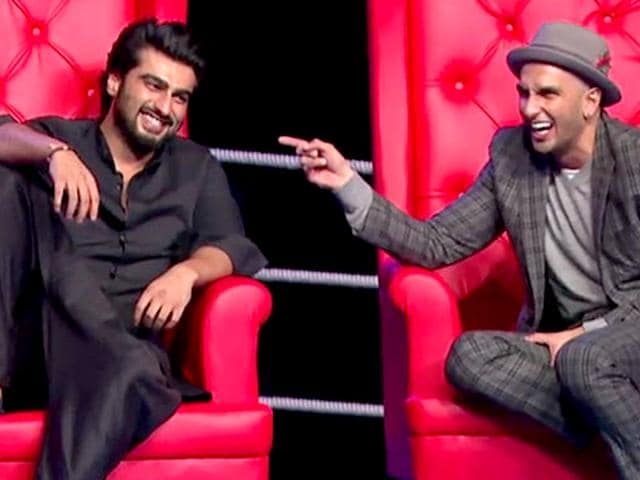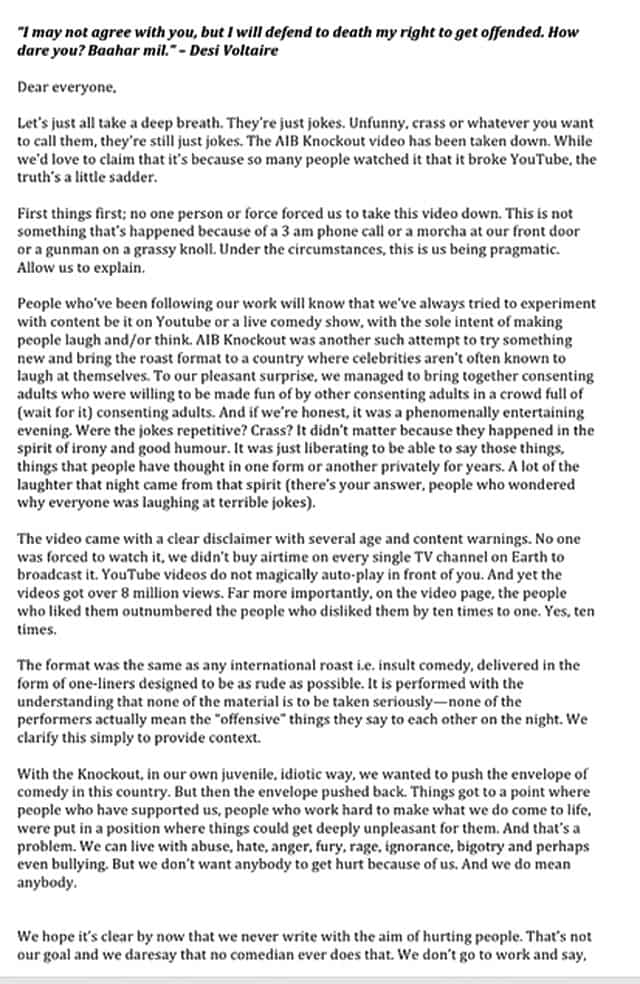AIB roast: Move beyond freedom of speech, seek reason
Soon after the AIB ran into controversy with the Maharashtra government, the popular narrative focused on the comics being the poster-boys of freedom of expression--perhaps in an attempt to have our own Charlie Hebdo moment.
Last week, while watching the comedy group All India Bakchod's (AIB) show, 'Knockout-The Roast of Arjun Kapoor and Ranveer Singh', I fell off my chair laughing. The bold humour by the seasoned comics, filled with sexual references and quips on Bollywood, was refreshing.

The three-part video of the show, which was filmed in a Mumbai stadium with an audience of 4,000 last month, went viral on the internet. The first part alone was watched more than 5 million times on YouTube in five days. The show was the talk of the town.
The plot changed rapidly: the show was accused of being vulgar, the Maharashtra government on Monday ordered a probe and AIB took down the video from YouTube late on Tuesday night.
It was reported that the government took the step after an unknown Hindu organisation Brahman Ekta Seva Santha registered a police complaint against the show for 'obscenity'. Santha claimed that the use of 'filthy language' in the show was an attack on 'Indian culture' itself. Quick to follow suit were five Christian organisations who approached the police alleging that the show insulted Jesus Christ.
Even as Ashoke Pandit, a member of the newly composed Censor Board, wrote on Twitter a crass comment on film director Karan Johar (who was a part of the roast panel) and compared the AIB Knockout to pornography, social media reverberated with cries denouncing the regressive intervention by the state. The absolute freedom to express and the right to offend were once again brought into prime time television debates and social media posts. In the popular discourse, the AIB comics were hailed as champions of freedom of expression.
What the Santha did against AIB was nothing new. Hindu-right organisations from the fringes have always been ready to spring up and even indulge in vandalism at the slightest opportunity possible, sloganeering as the saviours of Indian culture. From the painter MF Hussain to the Kiss of Love movement and from Wendy Doniger's book to PK, these organisations have not returned unoffended on any occasion.
Often, after conservative sections raise a voice against a book or film or painting, it attains a cult status, irrespective of its independent merit. The fact that it has offended someone, of whatsoever significance, becomes its claim to fame. The popular discourse immediately shifts towards a clash between freedom of expression and regression, without asking any questions on the artistic, or for that matter, the political significance of the art itself.
For example, though Taslima Nasreen's Lajja is not the best of her novels, yet the fact that a section of Muslims got offended by it propelled its popularity. Similar is the case of Salman Rushdie's Satanic Verses. Whether or not one has read the books, he or she is quick to jump on the bandwagon with an opinion on free speech.
Self-appointed 'culture police' organisations have rendered the business of taking offence so trivial that it hardly raises an eyebrow anywhere. They pop up whenever someone attempts challenging the mainstream narrative through one's art. And they never question or debate the issues they have on an open platform--resorting mostly to seeking bans or vandalism. Next in line are a section of the liberal intelligentsia who get busy in proclaiming that 'offender' as 'champion' of free speech, without seeking the rationale behind the bold expression, and restricting the issue only to the freedom to express anything and everything.
Thus, soon after the AIB ran into controversy with the Maharashtra government, the popular narrative focused on the comics being the poster-boys of freedom of expression--perhaps in an attempt to have our own Charlie Hebdo moment. But can an artist be a champion of freedom of expression just because obscure fundamentalist organisations 'took offence'? Shouldn't the questions that the artist raises, the authority that he challenges or the truth he speaks to power be the grounds of judging whether or not he is a genuine champion of the right to free speech?
After the AIB show, few asked whether overdosing the show with sexual-expletives was a necessary element of the comic script or included merely to grab the eyeballs and pander to a lowest-common-denominator of the audience. Whether the 'obscenity' in the show was a self-conscious act to showcase irreverence towards the rich and famous or was it being bold just for the sake of it. Were the jokes really 'sexist' or 'racist' or are these the reactions of a non-humorous nation?
The debate remained suffocated within the premise of freedom of expression or the lack of it.
A good point of reference is the Charlie Hebdo attack in Paris last month which had left 12 dead. Though at first most of the reactions were focused on the absolute freedom of expression of the cartoonists and decrying the violence, later, however, the debate broadened and tried to answer a wide array of questions.
Instead of only demanding the absolute right to free speech, international journalists and columnists talked about the condition of Muslims in France in contrast to the political significance of the cartoons, France's troubled history with Algeria, the need of political satire, the necessity of reform in Islam, Charlie Hebdo's editorial stands and the messages behind their cartoons. Such debates have immensely enriched the entire discourse on the matter, which a mere emphasizing on the freedom of expression would not have.
Read: AIB's official statement on why it took down the roast





